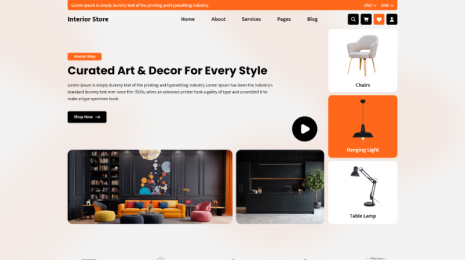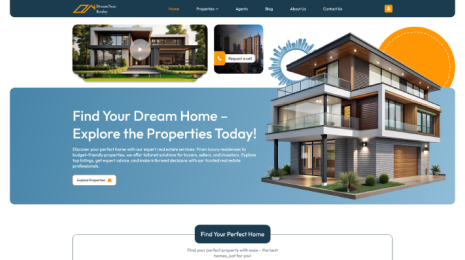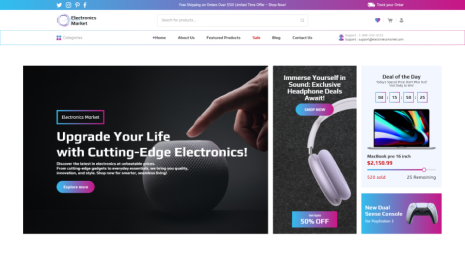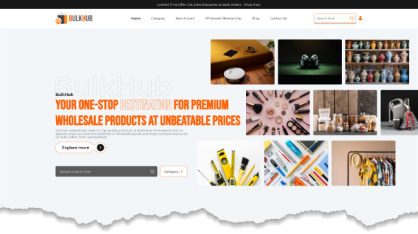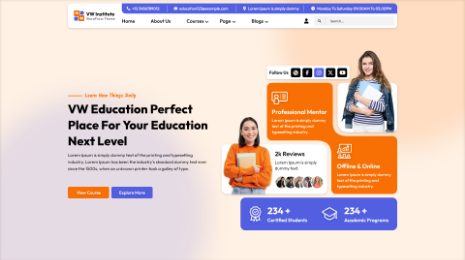
Are you tired of creating a website with multiple pages that only receive a handful of visits? Well, it's time to switch things up and focus on optimizing your single page website for search engines.
Contrary to popular belief, single page websites can be just as effective in driving traffic and conversions as their multi-page counterparts.
In this guide, we'll explore the tips and tricks to optimize your single page website to rank higher in SERP and ultimately achieve desired online success. So, grab a pen and paper, and let's dive into the world of single page website optimization.
What is a Single-Page Website?
The single-page website contains only one HTML page and doesn’t have any additional pages such as about us, contact us, features etc. These websites are fully loaded just on the initial page which is the homepage.
The advantage of a single-page website is that website visitors can learn about your website without needing to navigate. Single-page websites are meant for website owners who want a simple, responsive and mobile friendly website. It is great to fit if you want to sell or market a single product.
It is also a great fit if you want to run some campaign ideas or if you want to set up a website for non-commercial use. Hope you got to know what are single-page websites, now let’s see why the internet says they are bad from an SEO perspective.
Potential Benefits of Single Page Website?
A single page website can be a good option for certain types of websites, depending on their goals and content. Here are some potential benefits of a single page website:
Simplicity: A single page website can be easier to design and maintain than a multi-page website. There's no need to worry about navigation menus or linking pages together, which can make the process faster and more streamlined.
1. User Experience: With a single page website, users can quickly and easily find the information they're looking for without having to click through multiple pages. This can be especially beneficial for mobile users, who may not want to navigate through multiple pages on a small screen.
2. Storytelling: A single page website can be an effective way to tell a story or showcase a product or service. By creating a narrative flow through the page, you can guide users through your content and help them understand your brand and message.
3. Speed: Single page websites tend to load faster than multi-page websites, as there are fewer resources to load. This can improve the user experience and potentially improve search engine rankings.
4. Better Mobile Experience: Single page websites are ideal for mobile devices because they load quickly and are easy to navigate on a small screen.
5. Unique Design: Single page websites allow for more creativity in website design, making it stand out from other websites.
However, it's worth noting that single page websites may not be the best choice for all types of websites. If you have a lot of content to share or your website needs to perform specific functions (such as e-commerce or user registration), a multi-page website may be a better choice.
Ultimately, the best type of website for your needs will depend on your goals and the needs of your audience.
SEO Tips and Guide for Single-Page Websites
Link Building
It is a standard SEO tips that is essential to increase the reach and search engine rankings of every website. It becomes more important in the case of your single-post websites as they can’t hold much content hence the on-page SEO tactics become limited.
Therefore, you have to focus more on off-page SEO and building backlinks from the websites having a high authority domain. You can do guest blogs on other websites to gain a no-follow backlink from them or also use link-building tactics such as unlinked brand mentions, 404 link building etc. to drive external traffic towards your website.
The more backlinks you get from high-authority websites the more your site’s reach and ad traffic will increase.
Also, don’t forget to include social media sharing options in your single-page website so the website visitors can easily share your content on their social handles and increase the opportunity for you to receive more potential traffic.
Focus on Keywords
Keywords are one of the best SEO tactics to improve your site’s search engine rankings and in the case of single-page websites, it needs special attention. Since a single-page website only comprises a single webpage hence there is limited space to include all necessary keywords.
In addition to that, you can’t get traffic from the standard long-tail keywords due to the absence of detailed content on your single-page website.
Therefore, you have to put in the extra effort while searching for the best-performing keywords for your single-page website. Look for keywords that are a perfect fit that can resonate with your content and induce them into your single-page website to increase its search engine rankings and reach.
So, if you want to increase the reach and improve the search engine rankings of your single-page website, then make sure to give extra attention to your site’s keyword strategy.
Designed Content Sections
Even though your website is comprised of a single page but it is still necessary to have a well-structured website to deliver the content to your website visitors in the most effective way possible and mimic that your single page site contains different web pages in one HTML document.
Design each section of the content to make it look as if it is present on a different webpage with the help of <div> tags, H1 tags and anchor links. Separate and classify each section on one web page into a separate <div> tag.
If you aren’t familiar with HTML language and don’t want to get into the technical side then consider consulting with your web developer to separate the <div> tags.
Create an H1 tag for each section of your website as they give an idea of what a particular webpage is about.
Generally, in the case of a multipage website, it is advised to add one H1 tag on each page. But in the case of single-page websites, it is always good to go with multiple H1 tags.
As they assist your website to portray the presence of multiple web pages within one HTML document. Multiple H1 tags also provide a great opportunity to implement your keyword strategy to boost SEO.
Setting up anchor links on your single-page website is another great way to create sections into the content. Anchor links act as the primary navigation elements. These anchor links helps the website visitors to go through different content sections present on your single-page website. Search engines like Google also consider these anchor links while crawling websites hence it is a must to add them.
Designed and well-structured content sections help to split up your content and makes it easier for website visitors and search engine crawlers to navigate through content.
It can also drive direct traffic towards a particular page of your website. If you don’t want to create these content sections manually you can consider installing single page website WordPress theme.
Optimizing Loading Speed
Website loading speed is one of the important factors to improve the SEO of your one-page website. Since all the media files, elements and content is placed on the homepage hence it might be quite large and put a lot of loads on the server. This tend to increase loading speed of your website.
Having a bad loading speed can affect your search engine rankings as Google gives priority to the website having a good loading speed over websites having a bad loading speed. Hence it becomes a necessity to optimize the loading speed of your single-page website.
To optimize the loading speed, make sure to optimize website images by resizing and compressing it. This will reduce the load on the server and website will optimize for faster loading. You can also enable lazy loading for the images to increase the loading speed.
There are many image optimization plugins those can allows lazy loading bulky images appearing on visitors screen. It helps to reduce the load on the server and eventually increases the loading speed of your single-page website.
Along with that, cut off unnecessary plugin usage and reduce the number of HTTP requests to optimize the loading speed.
Implement Google Analytics
Google Analytics will help you to analyze the demographics, source of your website traffic. It also enables to know how user interact with your site’s content and spend time on your single-page website.
With the help of this data, you can get an idea of the amount and nature of your website traffic. Using this data you can take measures to improve the same.
It will also help you to track the best-performing keyword opportunities by tracking the internal search. Google analytics can help you track the backlinks associated with your single-page website.
Google Analytics is a sure-shot way to track a record of your SEO tactics application on your single-page website. Hence make sure you implement Google Analytics on your website to get the best out of your SEO tactics.
Final Thoughts
In conclusion, single-page websites can be a powerful tool to get your business online. However, optimizing these websites for search engines requires careful consideration of content, structure, and technical factors.
By following best practices outlined in this guide, you can improve website's visibility and attract more traffic to your business. Remember to focus on providing high-quality content, utilizing relevant keywords, and incorporating effective metadata and backlinks.
With the right approach, your single-page website can achieve great results and help your business succeed online.


